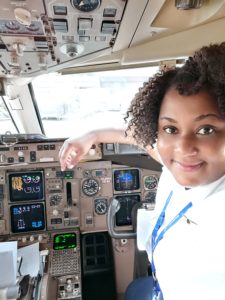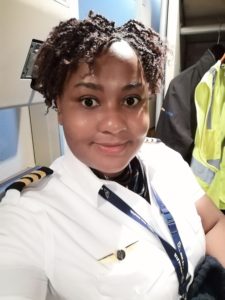
First Officer Phyllis Manoah in the cockpit.
Growing up in Melbourne, Australia, Atlas Air 747 First Officer Phyllis Manoah loved scrambling up to the rooftop of her home, where she would dream about her future.
“We lived near an airport, and my brother and I loved watching the 74 birds come in,” Phyllis recalled. “I was about eight at the time, and I remember telling my brother, ‘We could be pilots and get as far away as possible and never have to do any chores again!’”
Phyllis’s dream began to take shape in high school. Once students in Australia complete secondary school, they take a series of tests designed to identify career paths that best match their strengths. When Phyllis came home with her report, she shared it with her parents and asked for their help in how to become a pilot.
“My parents guided and encouraged me,” said Phyllis. “They helped me select the right courses for the remainder of high school and helped me study for my exams. My stepdad played an important role in keeping me on track. With their support, I received a partial bursary to The Royal Melbourne Institute of Technology (RMIT) and earned my Bachelor of Applied Science (Aviation).
After graduation, Phyllis’s career took off at an airline in Singapore. She first worked as a flight attendant and then transitioned into Crew Scheduling. Because she wasn’t required to travel, this position enabled her to continue to make progress on getting her pilot’s license.
Once she was ready to start building the required 1,000 total hours of flight time, Phyllis made the tough decision to move to Papua New Guinea because low-hour jobs were in short supply locally.
Remote yet breathtaking, Papua New Guinea is considered one of the most isolated and dangerous places to fly. And although everyone told her not to go, Phyllis took the job with an Indonesian airline in pursuit of her dream. She began flying in medical supplies and materials for mining and construction in one of the most hostile regions of the world. She stayed six years.

First Officer Phyllis Manoah
“Landing amidst so much unknown eventually took a toll on me,” Phyllis shared. “And the risk got to be too great.”
In 2014, Phyllis left Papua New Guinea and headed to the United States to obtain FAA certification.
“My first job in the States was as a First Officer on the ERJ 145 for a regional carrier,” said Phyllis. “A few years into the job, a colleague of mine introduced me to friends at Atlas, who were just so passionate about the airline. They told me they were hiring, and I should consider it. I was intrigued as it felt like I was coming full circle: My office at my first job for the Singapore airline – my first in the industry – had a view of the ramp where Atlas parked. I can’t tell you how many times I would look out the window, just mesmerized by the 747 tail.”
Phyllis joined Atlas in December of 2019. She flew the 767 for almost two years and recently transitioned to the 747.
“The first plane I ever stepped foot in was a Qantas 74. It’s a majestic and beautiful plane, and it’s the plane I have always associated with Atlas. It’s the pinnacle of my dream coming to fruition,” said Phyllis.
Here at Atlas, in addition to advancing her career, Phyllis has been an integral part of the effort to advance diversity, equity and inclusion (DEI) within our workplace.
“I joined the DEI Employee Council to be part of an inclusive support network that strives to create a safe and efficient environment for all,” said Phyllis, who has Indigenous Australian as well as Zimbabwean heritage.
This commitment to fostering a culture of inclusion extends beyond Atlas; Phyllis is an active member of two organizations of professional Black pilots who are committed to supporting future Black aviators through mentorship, professional development, outreach and scholarship.
Phyllis credits the stories shared within the African American community, and particularly during Black History Month, as the impetus for her involvement.
“It’s important to discuss how African American pioneers – despite the odds being stacked against them – made history and paved the way for future generations,” said Phyllis. “I have found that sharing these stories in communities like OBAP and Sisters of the Skies inspires and encourages us to work together to achieve our dreams, too.”